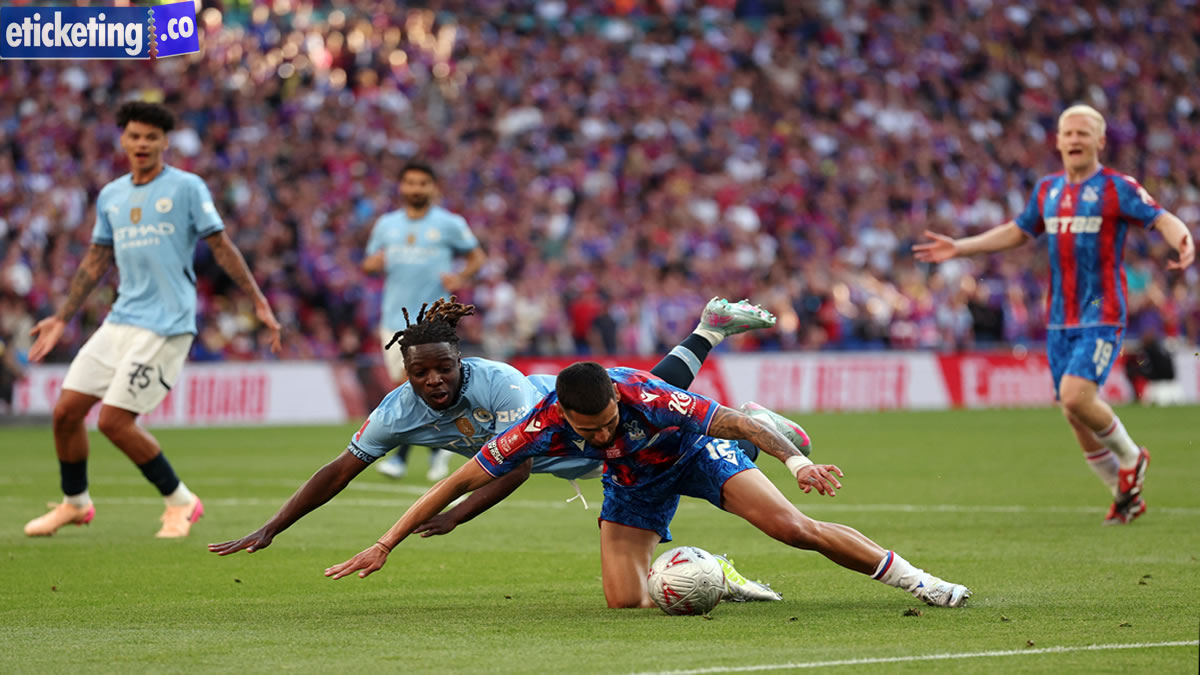The FA Cup Final stands as a historic milestone in the world of football. Representing far more than just a competition. The FA Cup itself was the inaugural tournament of its kind. Setting the standard for how the sport would be organized and structured in the years to come.
Eticketing.co offers unbeatable deals on FA Cup Final Tickets. Football fans can grab these tickets at specially discounted prices exclusively through this trusted platform. Whether you’re aiming to secure your place at the final or looking for a great value offer, Eticketing.co guarantees a smooth and reliable purchasing experience.

By providing a blueprint for formal competition, it played a pivotal role in transforming football from a loosely arranged pastime into a professionally governed game. Both in England and internationally, the FA Cup has long been regarded as the founding father of organized football. Inspiring countless leagues and tournaments across the globe to follow in its footsteps. And shaping the modern game into what we know today.
Origins of the FA Cup Final and Its Place in Football
The FA Cup Final has always been more than a football match; it quickly became a worldwide sporting spectacle. What started as the conclusion of an English season soon developed into a global celebration, captivating audiences across the continents. Known as the best-loved and most widely followed domestic competition. It drew fans together in ways that few other sporting events could. Making it a must-watch fixture that transcended borders and cultures.
Professionalism, Rivalries, and the FA Cup Final Spirit
Beyond its glamour, the FA Cup Final also served as a breeding ground for professionalism and club rivalries. It encouraged competition between both the giants of the game and the smallest local clubs. Proving that determination and teamwork could shake the established order. At the same time, it was the driving force behind football’s growing global television market. The beauty of the tournament lay in its unpredictability showing time and again that underdog. Teams could topple even the most decorated clubs, often in the most testing winter conditions.
A Bridge Between Classes Through the FA Cup Final
The FA Cup Final reflected the social dynamics of the country. Uniting both Victorian elites and working-class communities. Long before league football created rigid hierarchies, the tournament provided an equal platform where postmen. Clerks, and factory workers could dream of competing in grand stadiums like Old Trafford or Anfield. This unique opportunity kept the competition special. Embodying the democratic essence of football and ensuring that it remained accessible to all social backgrounds. Also Read FA Cup Final 2026 Scout

FA Cup Final as Football’s Human Story
The FA Cup Final also stood as a cultural mirror of human ambition, resilience, and drama. It showcased triumphs, heartbreaks, and unforgettable stories of both teams and individuals. Following the foundation of the Football Association in 1863 and the introduction of standardized rules. The cup became a platform to unite schools, churches, and industrial teams across the nation. It created a competitive arena that reflected not only footballing skills. But also, the broader human experiences of hope, unity, and perseverance.
Charles Alcock’s Vision and the First FA Cup Final
The FA Cup Final owes much of its existence to Charles W. Alcock. The visionary secretary of the FA. In 1871, Alcock proposed the establishment of a Challenge Cup. Drawing inspiration from his school experiences at Harrow and the expanding railway network that made nationwide competition feasible. His forward-thinking idea led to the creation of the first tournament. With just a dozen clubs competing across 13 matches.
The inaugural final in 1872 at Kennington Oval saw Wanderers defeat the Royal Engineers. With Alcock himself playing for the winning side. Forever linking his name to football’s greatest tradition.
The Rise of Professionalism in the 1880s
As football grew, professionalism became unavoidable, legalized in 1885. The FA Cup played a critical role in this transformation, with northern clubs such as Blackburn Olympic and Blackburn Rovers leading the charge. These clubs invested heavily in their squads, marking the beginning of a new era where money, training, and dedication could tip the balance of power. Amateur southern teams were soon eclipsed.
And the competition became a proving ground for this professional revolution. Laying the foundation for what would eventually become the Football League.
Eticketing.co presents unmatched opportunities for securing FA Cup Final 2026 Tickets. Football enthusiasts can seize these tickets at exclusive, reduced rates, only available on this trusted platform. Whether you’re aiming to reserve your place at the grand finale or seeking the best value, Eticketing.co guarantees a seamless and dependable ticket-buying journey.

The Trophy, Tradition, and the Magic of the Cup
The physical FA Cup trophy itself became a symbol of prestige and desire. After Aston Villa’s triumph in 1895, the original cup was stolen. Prompting the creation of a replica that would endure until 1910. By then, the competition was associated not only with glory but also with remarkable upsets and romantic tales of underdogs. Notts County’s 1894 win as a Second Division side and Tottenham’s 1901 triumph. As a Southern League club captured imaginations. Reinforcing the enduring concept of “giant-killing” that continues to define the competition’s magic.
Wembley, the White Horse Final, and Global Fame
The 1923 final marked a turning point as the competition moved to Wembley Stadium. Known as the “White Horse Final,” it became iconic when mounted police cleared overflowing crowds to allow the game to proceed. With over 100,000 official attendees though many believed it was closer to double. The match highlighted the unparalleled popularity of the competition. This moment entrenched Wembley as the home of English football. And the FA Cup final became synonymous with the stadium. Amplifying its significance on both national and international stages.
The Impact of Radio and Television
Technological advances further enhanced the FA Cup’s prestige. The 1927 final, when Cardiff City defeated Arsenal, became the first broadcast on national radio. Reaching millions who could not attend. By 1938, television brought full coverage of the final into homes. Making football accessible in a new way. These broadcasts expanded the competition’s audience and solidified its place in the cultural fabric of the nation. The tournament was no longer just about those inside the stadium but about uniting families and communities through shared experiences.
Giant-Killings and Post-War Football
The tradition of giant-killings thrived after the Second World War. Clubs like Yeovil Town shocked the nation by defeating Sunderland in 1949. Showing that smaller clubs could still topple wealthy giants. These upsets reinforced the magic of the competition, keeping fans enthralled year after year. As football resumed after wartime suspension. The FA Cup offered a sense of hope and entertainment for a recovering nation, with the final often serving as a joyful national celebration.

The Matthews Final and Golden Eras
One of the most memorable moments came in the 1953 Matthews Final. When Stanley Matthews inspired Blackpool to a 4-3 comeback win against Bolton Wanderers. At the age of 38, Matthews finally lifted the trophy, and the story became legendary. Symbolizing persistence and artistry. In the years that followed, the FA Cup produced further unforgettable moments. Including Bert Trautmann’s heroic performance with a broken neck in 1956 and Tottenham’s double-winning triumph in 1961. These golden years cemented the final as the pinnacle of English football drama.
Cultural Moments and Emotional Finals
The competition also captured unforgettable cultural moments. From Everton fans celebrating wildly in 1966 to the bruising battles of the 1970 final between Chelsea and Leeds. The FA Cup reflected not just the sport but also the passions of society. Arsenal’s 1971 triumph, completing a league and cup double. Highlighted the prestige associated with the tournament. Each final provided a snapshot of its era, marking football’s role in national life.
The 1970s and the Rise of the Underdogs
The 1970s brought an extraordinary series of shocks that embodied the romance of the cup. Hereford United’s famous win over Newcastle United in 1972. Thanks to Ronnie Radford’s thunderbolt goal, became one of the most celebrated moments in football history. Sunderland’s 1973 victory over Leeds United and Southampton’s 1976 upset of Manchester United further reinforced the belief that anything was possible in the competition. These moments of magic captivated fans and created legends for clubs beyond the top tier.
The 1980s Drama and Tragedy
The 1980s carried both triumph and tragedy. Memorable victories such as Ricky Villa’s dazzling solo goal in 1981 and Wimbledon’s “Crazy Gang” overcoming Liverpool in 1988 showcased the unpredictability of the tournament. Yet, the decade was also overshadowed by the Hillsborough disaster in 1989. A tragedy that cast a lasting shadow over the competition. Even so, the FA Cup remained a powerful force. Producing drama that captivated fans while also serving as a reminder of football’s responsibilities.
The Move to the Millennium Stadium
When Wembley closed for redevelopment in 2000, the final moved temporarily to the Millennium Stadium in Cardiff. Surprisingly, this change reinvigorated the competition. The 2001 final saw Michael Owen’s late heroics rescue Liverpool. While the 2006 final became famous for Steven Gerrard’s long-range equalizer, taking the game into extra time. These moments reinforced the drama and unpredictability of the competition. Keeping its legacy alive even outside its traditional home.

Modern Magic and the Continuing Legacy
In recent decades, the competition has continued to produce remarkable stories. Wigan Athletic’s 2013 triumph over Manchester City. Bradford City’s remarkable run in 2015, and Lincoln City’s fairytale journey in 2017. All reminded fans that the competition still belongs to the dreamers. No matter how much football evolves. The FA Cup continues to unite fans and inspire moments of magic that resonate far beyond the pitch. It remains not just a football tournament but a timeless tradition that symbolizes passion, possibility, and the enduring spirit of the game.
We provide FA Cup Final Tickets for fans. Offering a chance to secure FA Cup Final 2026 Tickets through our trusted online marketplace. Eticketing.co is dedicated to celebrating the excitement of this epic showdown and is your most reliable source for booking FA Cup Final Tickets.
